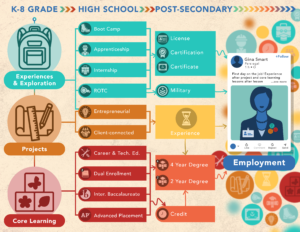22 Ways to Make the Most of Your Job or Internship

Landing an internship or an entry-level job can be a great way to get a jump start on a career you love, or to find out that your “dream job” is actually your worst nightmare. Either way, it’s a win for you long term. Showing up may be 80% of life, but it takes more than just showing up to make the most of your job or internship.
Here’s our list of 22 tips to maximize your internship or entry-level job experience.
- Go in with a game plan. Think about your own personal and professional goals and design a game plan that aligns your job duties with those goals. Ask yourself questions like, “What would make this feel like a productive use of my time?” and “How does this internship get me closer to my professional goals?”
- Get to know your direct supervisor. Make sure you have a direct supervisor and meet with him/her early and often to establish and recalibrate expectations. Work together to establish regular check-ins and determine the best way to communicate between formal meetings. Share your goals and game plan with you supervisor and ask him/her for potential opportunities that will help you achieve your goals. Make sure you explicitly ask for ways you can best support the company or organization and adjust your game plan to ensure you meet those expectations, in addition to your own. Remember, it’s not just about you.
- Don’t expect to steer the ship. Being an intern or working entry-level means keeping your ego in check–especially in the beginning. Expect some menial tasks, and remain grateful for any and every opportunity. Find yourself just pouring coffee and making copies a few weeks in? It’s time to talk to your supervisor about goals and expectations. In the meantime, find ways to prove your value by stepping up your game with other items on this list.
- Seek opportunities to listen and learn. Just listening in on a phone call or meeting might not be the most invigorating way to spend a couple hours, but you’ll be surprised by how much you learn if you actively listen. There are opportunities to learn about the company, content, work norms, people and players that happen in each and every meeting. It’s helpful to keep a journal or to make notes with questions you can later ask your supervisor, mentors, etc.
- Meet people. Just because you have a direct supervisor or a specific department doesn’t mean you should only associate with those people. Introduce yourself to others outside your team, share your passions and consider every conversation a potential opportunity.
- Prove yourself. It can take awhile to earn trust and respect, but you can fast track this by paying attention to detail and going above and beyond what is expected of you. You’ll be surprised at how quickly your responsibilities grow and evolve as you prove yourself and establish trust.
- Share your ideas. If you’re talking to a lot of people and actively listening as much as you should, you’ll start to develop some of your own great ideas. Don’t be afraid to share them. Fresh perspectives can be powerful. Make sure that you talk through how best to share your ideas with your supervisor before you raise your hand and interrupt during a CEO presentation. Not ready to publicly put yourself out there just yet? Shoot an email to the person or the team after the meeting or bring up your idea later in a less formal setting. Either way, let them know you’re all-in on contributing to the company or organization.
- Take initiative. Pay close attention to the rhythm of the job and the roles people play so you can start to anticipate needs before tasks are directly assigned to you. Getting your work done in 2 hours instead of the 5 hours allocated? Come up with an idea that you think would be a good way to spend the extra 3 hours and present the idea as an option to your supervisor. Get approval before you use on-the-clock hours differently that they were assigned, but always look for new ways to add value.
- Keep it professional. Even if you feel like you’re living a double life, remember when you’re at the job to stay focused on the job. Keep the details of last week’s crazy party to yourself. Don’t complain about your lousy roommate. Show up rested, prepared and professionally dressed.
- Pick a project (or two). While some of your duties may be ongoing and somewhat vague, look for at least one project that you can complete during your internship that will generate some tangible evidence of you work. Plan your project early on and work with your supervisor to develop some project management and execution skills. For bonus points, pick a project that you can also work on outside of your time in the office and present what you learned to the team.
- Keep your attitude in check. If you find yourself in the middle of a conversation that goes negative, it’s in your best interest to stay positive or to disengage completely. Don’t join office gossip or talk negatively about people or products. If this happens regularly, especially with the same people, bring it up to your supervisor. Otherwise, politely look for ways to exit the conversation and avoid similar situations in the future.
- Get comfortable with constructive criticism. One of the best ways you can learn from a new job or internship is to ask for feedback. Don’t always assume that no news is good news. Expect that your peers and mentors will have ideas for ways you can improve and see these as opportunities. Have an “always learning” mindset and don’t take constructive criticism personally.
- Ask questions. It’s not always good to fake it ’til you make it. No one expects someone in your position to know everything. If you don’t know something, ask. Or better yet, see how far you can get to finding out the answer for yourself through available resources and then check for clarity and understanding.
- Follow work culture norms. Every workplace has its own norms, and not all of them our written policies and procedures. Do people always show up five minutes early to a scheduled meeting? Does the Director always sit in a particular part of the room? Is checking your phone appropriate or inappropriate during a meeting? Pay attention so you can adapt accordingly.
- Build your network at every turn. Get and stay connected with the people you meet within and beyond your specific team. Connect on LinkedIn after you meet someone in person. Make and share professional business cards. Engage with your peers and mentors on social media as well as in the office.
- Repeat after me, “Yes.” You’ll get invited to a lot of things–meetings that weren’t on your calendar, phone calls you didn’t know were happening, trainings, workshops, appointments, events. Say yes to as many of these opportunities as you can. Go in with an open mind and a place to take notes.
- Reflect on your experience as you go. Don’t wait to the end of the internship or your annual review to reflect on your work. On a weekly or monthly basis, pause to reflect on questions like, “What am I really good at doing? What do I need to learn more about? What parts of this job are the most rewarding? What challenge did I overcome? Are there any potential concerns I need to address with someone? What would I love to be doing more of?”
- Put yourself out there. Sit by the CEO. Take on new job duties. Volunteer to lead a project. Ask for more responsibility. Challenge yourself.
- Show your gratitude. Thank people for the opportunities they’ve created for you, and thank them for their time and energy. Show your appreciation and remain grateful.
- Schedule an exit interview. When your job or internship is coming to an end, schedule a formal exit interview with as many people as you can. Ask for their opinion about your top traits, as well as their perspective on areas where you can improve. Make a specific ask for a letter of recommendation or review on LinkedIn or a quote about working with you.
- Plan your next internship or job. Reflect on the full experience, and determine what’s next for you. Did you reach your goals for this job? What new goals do you have? Plan accordingly.
- Stay in touch. Don’t drop the relationships because the job ends. Keep in touch. Share updates from future jobs, ask for updates from them, connect people and ideas. It’s a small world, and expect that your paths will cross again.
What did we miss? Current and former interns–what would you add? Intern managers and supervisors, what did we miss? Tell us in the comments or tweet us at #GenDIY.
eduInnovation and Getting Smart have partnered with The J.A. and Kathryn Albertson Family Foundation to produce a thought leadership campaign called Generation Do-It-Yourself (GenDIY)–how young people are hacking a pathway to a career they love–on The Huffington Post and GettingSmart.com. This campaign about reimagining secondary and postsecondary education and career skills will explore the new generation building a global economy and experiences that are impact driven and entrepreneurial. For more on GenDIY:
- The Rollercoaster of Career Choice: From Aspiring Physicist to Social Entrepreneur
- Dropping out of High School? Go to College Instead
- Utilizing Mentors When They Are Needed Most
Stay in-the-know with all things EdTech and innovations in learning by signing up to receive the weekly Smart Update. This post includes mentions of a Getting Smart partner. For a full list of partners, affiliate organizations and all other disclosures please see our Partner page.





Rachel Frampton
I am a vet student and as well all know applying for an internship is a huge factor when it comes to gaining experience in my chosen field; that's why I'm currently looking for a clinic where I could apply. I'm glad you shared this; I'll make sure to familiarize myself with the direct supervisors. I'd also keep in mind to prepare myself or any menial tasks, and listen to the instructions attentively.